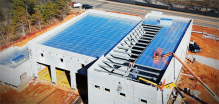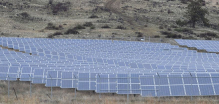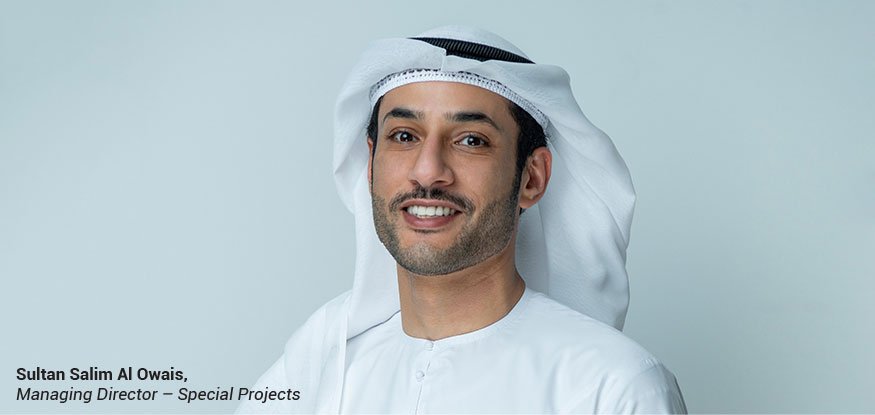The UAE has been at the very forefront of integrating innovative smart city technologies and solutions into the country’s infrastructure. In pursuance of this, countless initiatives are currently underway to ensure public services, urban planning, healthcare, education, electricity, transport, communications and infrastructure, among many others, are consistently being digitally transformed.
In the case of the UAE, EVOTEQ has been a key enabler in the field of smart city development and digital transformation. A journalist from Smart Cities World Forums managed to secure an exclusive interview with EVOTEQ’s Managing Director of Special Projects, Sultan Salim Al Owais, to discuss the company’s latest innovations in this space.
Smart Cities are by no means a new idea in this region and EVOTEQ has been instrumental in making this happen. To what extent do you think the UAE has been successful in establishing smart city infrastructure and where are the areas for improvement? Tell us more about some of the company’s recent work in deploying smart city infrastructure.
The UAE has shown itself to be a pioneer in deploying new, advanced, smart technologies and infrastructure. With the National Innovation Strategy 2021 in place as a roadmap, the country has been making remarkable headway in the areas of artificial intelligence (AI) and digital government. The major cities of the UAE have already initiated large-scale projects including integrated government services, smart power grids, e-wallets, the deployment of 5G networks, and public Wi-Fi.
These are all noteworthy achievements – and the future success of smart cities in the UAE will depend on the groundwork being done now. A key aspect of that is the attention being paid to data centers, which will in essence become the backbone for smart city infrastructure. Data centers are an essential step to enable development of smart cities, through safeguarding business continuity, critical operations and data sovereignty.
The UAE is working to respond to local and international demand for best-in-class data centers and we are building the first Tier-3 industry-standard data center in Sharjah with Khazna, a leading data center developer. The center will provide scalability opportunities for commercial and government entities.
Beyond our work on the data center, we are also supporting the UAE through the development of innovative platforms that enable a smarter and innovative way of life for residents and employees in smart cities. Our key focus has been smart transport systems and smart buildings, but we are also involved in other aspects of smart city infrastructure.
Within the smart transport sector, we have been working with Sharjah City Municipality to introduce a seamless, automated parking system that reserves space for vehicles. Utilizing Artificial Intelligence and smart applications, the Sharjah Smart Parking initiative will allow citizens and residents to identify and reserve parking through their smart phones. The system will control pricing, virtual payments, and remote enforcement – easing the frustration of daily parking struggles and saving valuable time and effort on the part of motorists.
Similarly, our smart building offering will be crucial to the future of urban design of smart cities. Featuring a virtual AI persona and voice-activated interface designed to operate hundreds of use cases, we are helping our clients optimize operating expenditures, energy management, predictive maintenance, employee productivity and smart security. Using a Digital Twin, the smart building technology monitors, analyses and predicts energy consumption, as well as any building management faults through machine learning.
Could you provide us with some insight into why EVOTEQ chose to enter the data center space and how this technology will contribute to the country’s digital transformation?
The UAE has been very vocal as to its ambitions to digitally transform the country and has launched several in-depth strategies around implementing new technologies such as the UAE Artificial Intelligence Strategy 2031, the UAE Strategy for the Fourth Industrial Revolution, the UAE National Innovation Strategy, , the Emirates Blockchain Strategy 2021, and the UAE Centennial 2071 Plan.
Not only that, but recently, the UAE government declared its support for accelerating the transition to a full-scale digital economy as part of its COVID recovery plans. This will mean there will be a strong push to activate and deploy 5G networks and relevant cutting-edge technologies that will support the overall transformation for government and industries. This will include advanced data centers which is why we decided to enter the space and support the UAE in building the needed infrastructure.
In addition, regional demand for data centers is growing rapidly, and investment in data storage in Saudi Arabia and the UAE is expected to rise to more than Dh1.5 billion in 2022, according to the International Data Corporation. With demand for real-time data transmission at its peak, businesses and governments need data backup as a first step to ensure smooth, continued operations in the face of any disruption as well as protection against damage, theft, and software failure which can be all too common. Again, data centers are the key solution here, which is why we took a proactive approach in providing one for Sharjah.
As networks become a great deal more complex, do you think we have the level of cybersecurity required to support them and new emerging technologies? What is EVOTEQ’s impact in this space?
With the added complexity of our networks and increase in interconnectivity, we are seeing an increase in cyberattacks. The UAE, as one of the most digitally connected countries in the region with a high smartphone adoption rate, will need to take proper precautions, especially as we bring more and more services and operation on to our networks, we make ourselves more vulnerable. This will result in cyber threats continuing to evolve meaning that cybersecurity is not a one-time solution, but a business approach that will need to be constantly updated to address new issues faced by digital infrastructure. A recent report shows that the oil and gas sector, telecommunications, government departments and other critical infrastructure-related fields are particularly at risk from cyberattacks – and therefore in the most need of protection.
Cybercrimes should be viewed as a significant business priority especially due to the financial, reputational and regulatory impact these occurrences have. Organization need to assess their digital resilience, identify key focus areas and assets that need to be safeguarded and invest in digital-security solutions.
Within this space, we at EVOTEQ work hand in hand with clients as part of our consultative selling offering to assess digital infrastructure and cyber risks after which we make recommendations to fortify and secure operations.


















